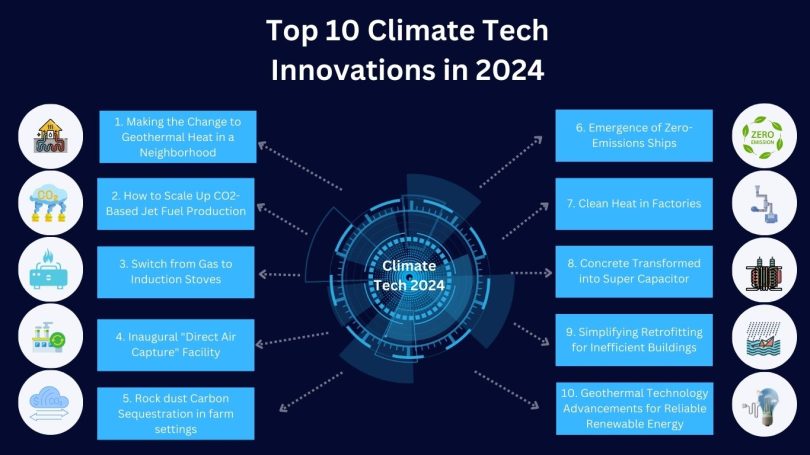Climate tech advancements like the use of food waste to power ships and the production of jet fuel from CO2 are potential saviors. Climate challenges have slowly been addressed in the process, while climate technology deployment has taken off. There is an acceleration of the energy transition as indicated by a global commitment to triple renewable energy output before the decade ends and the pivotal moment for electric cars. These examples, including a factory producing jet fuel from CO2 or a cargo ship powered by green methanol generated from food waste, illustrate the upward trend. This collection draws attention to innovative proposals that fuel optimism about the ongoing efforts to overcome negative impacts of climate change.
- Making the Change to Geothermal Heat in a Neighborhood:
As the clean energy transition spans beyond individual homes, heat pumps are now more popular than gas furnaces. A Boston suburb has local utility Eversource guiding an entire community toward geothermal heat. This innovative project implies the connection of many buildings from private family houses to small businesses and low-income apartments together with a network that captures underground heat through pipe distress. The scalable pilot project sets the standard for massive moves toward cleaner energy solutions.
- How to Scale Up CO2-Based Jet Fuel Production?
Twelve is a pioneering Start-up in Washington State that already has made significant leaps toward the construction of a new factory for CO2-based jet fuel production. Twelve intends to manufacture jet fuel competitive with conventional alternatives in terms of cost using captured CO2, water and renewable electricity. This facility is set to have Alaska Airlines among its initial customers in the next production.
- Switch from Gas to Induction Stoves:
Due to the health and climate issues associated with gas stoves, more people including professional cooks are turning to induction stoves. So, startups such as Impulse and Channing St. Copper Co. design user-friendly models with advantages like speed, precise control or even energy storage capacity. Rebates on induction stoves will be available in the U.S within this year under Inflation Reduction Act
- Inaugural “Direct Air Capture” Facility:
Heirloom in California’s Central Valley runs the country’s first operational “direct air capture” facility. The plant uses crushed mineral powder to extract CO2 from the atmosphere, with the intentions of partnering up with CarbonCure for long-term storage in concrete structures. Heirloom is hoping to take out 1 billion tons of CO2 by 2030.
- Rock dust Carbon Sequestration in farm settings:
Making use of crushed rocks, Lithos is a startup that benefits both farm yields and CO2 sequestration by applying basalt dust on the fields. 2021 founding, Lithos is already working with over 80 farms and has recently won $57.1 million promise from Frontier which supports carbon removal.
- Emergence of Zero-Emissions Ships:
Zero-Emission is a concept of an upcoming cruise ship contains gigantic sails that are covered in solar panels, merging wind and solar power. Norway-based Hurtigruten is the developer of this cruise ship which will likely be announced as being practically zero emissions by yearend. Similarly, there are ships with low emissions like a Maersk cargo vessel that operates using green methanol derived from food waste as an example of the industry’s commitment to eco-friendly maritime functionalities.
- Clean Heat in Factories:
Heating in factories consumes a substantial part of energy while most depend on natural gas or coal. Antora is a groundbreaking startup that covers the area of renewable energy by heating large carbon blocks and releasing heat whenever necessary. The system is cost competitive with fossil fuels through the storage of surplus solar or wind power. Based on a successful pilot in California, Antora is slated to start producing this revolutionary technology in 2024.
- Concrete Transformed into Super Capacitor:
Researchers from MIT are re-making a pollutant concrete using carbon black. This innovation allows for the production of concrete that can store energy. In the future, rooftops might store solar energy harvested from a building.
- Simplifying Retrofitting for Inefficient Buildings:
Historically, the energy inefficiency of older apartment buildings has been expensive and disruptive to address. A startup named Hydronic Shell Technologies proposes an integrated solution with panels having built-in insulation and heating/cooling equipment. Building upgrades become as simple as changing a facade. The startup plans to carry out its initial pilot project in a Rochester, New York low-income apartment building.
- Geothermal Technology Advancements for Reliable Renewable Energy:
In the Nevada desert, Fervo an innovative startup has introduced power supply to the regional grid and Google data centers thanks to its next generation geothermal power plant. Fervo’s technology enables geothermal power generation from drilling deep underground and horizontally, using hot rocks to heat water into steam in all locations. This constant and clean energy source comes as an indispensable solution for the supply to fill gaps in instances when solar or wind energy is not available.
Final Thoughts:
It is imperative that we’ve entered a turning point in the climate struggle and these ten innovations demonstrate that creativity will propel us to a cleaner future. They take on simple and audacious solutions from community geothermal heat to jet fuel made from CO2. CO2-based fuels, induction stoves and geothermal networks are the forerunners of energy transition. Technologies such as Heirloom’s direct air capture and Lithos’ rock dust sequestration are technologies that actively extract and store carbon activate, which is a game changer in mitigating climate change. Even shipping, traditionally one of the biggest polluters, is turning green with zero-emission ships powered by wind, solar and fuel from food waste. Antora’s parsimonious factory heat and Hydronic Shell’s building retrofits on land dramatically reduce emissions and energy usage. Finally, Fervo’s geothermal innovations open up steady renewable energy that does not depend on the presence of sun or wind. The potential is staggering; imagine these innovations on a grand scale, sparking even more breakthroughs and motivating global action for a sustainable future. This is not a bunch of stylish tech; it’s a plan that will lead to a healthier planet fueled by renewable energy and sustainable processes. Let’s ride this wave of innovation, embrace these solutions and change the tide on the climate crisis. Now is the time to act, and these brilliant technologies have been a beacon of hope for an improved future.




Leave a Comment